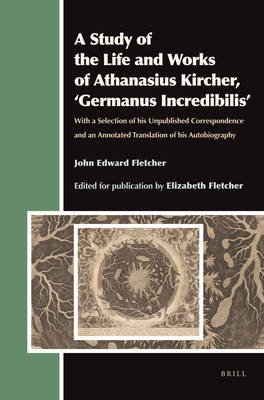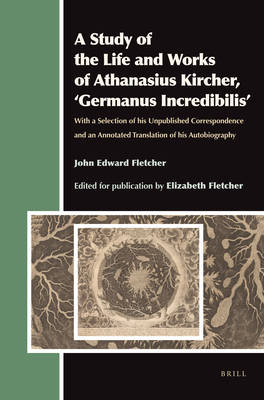
- Afhalen na 1 uur in een winkel met voorraad
- Gratis thuislevering in België vanaf € 30
- Ruim aanbod met 7 miljoen producten
- Afhalen na 1 uur in een winkel met voorraad
- Gratis thuislevering in België vanaf € 30
- Ruim aanbod met 7 miljoen producten
Zoeken
A Study of the Life and Works of Athanasius Kircher, 'Germanus Incredibilis'
With a Selection of His Unpublished Correspondence and an Annotated Translation of His Autobiography
John Edward Fletcher
€ 425,95
+ 851 punten
Omschrijving
Athanasius Kircher, a German Jesuit in 17th-century Rome, was an enigma. Intensely pious and a prolific author, he was also a polymath fascinated with everything from Egyptian hieroglyphs to the tiny creatures in his microscope.
His correspondence with popes, princes and priests was a window into the restless energy of the period. It showed first-hand the seventeenth-century's struggle for knowledge in astronomy, microscopy, geology, chemistry, musicology, Egyptology, horology... The list goes on.
Kircher's books reflect the mind-set of 17th-century scholars - endless curiosity and a substantial larding of naiveté Kircher scorned alchemy as the wishful thinking of charlatans, yet believed in dragons.
His life and correspondence provide a key to the transition from the Middle Ages to a new scientific age. This book, though unpublished, has been long quoted and referred to. Awaited by scholars and specialists of Kircher, it is finally available with this edition.
His correspondence with popes, princes and priests was a window into the restless energy of the period. It showed first-hand the seventeenth-century's struggle for knowledge in astronomy, microscopy, geology, chemistry, musicology, Egyptology, horology... The list goes on.
Kircher's books reflect the mind-set of 17th-century scholars - endless curiosity and a substantial larding of naiveté Kircher scorned alchemy as the wishful thinking of charlatans, yet believed in dragons.
His life and correspondence provide a key to the transition from the Middle Ages to a new scientific age. This book, though unpublished, has been long quoted and referred to. Awaited by scholars and specialists of Kircher, it is finally available with this edition.
Specificaties
Betrokkenen
- Auteur(s):
- Uitgeverij:
Inhoud
- Aantal bladzijden:
- 656
- Taal:
- Engels
- Reeks:
- Reeksnummer:
- nr. 12
Eigenschappen
- Productcode (EAN):
- 9789004207127
- Verschijningsdatum:
- 25/08/2011
- Uitvoering:
- Hardcover
- Formaat:
- Genaaid
- Afmetingen:
- 163 mm x 249 mm
- Gewicht:
- 1224 g

Alleen bij Standaard Boekhandel
+ 851 punten op je klantenkaart van Standaard Boekhandel
Beoordelingen
We publiceren alleen reviews die voldoen aan de voorwaarden voor reviews. Bekijk onze voorwaarden voor reviews.








